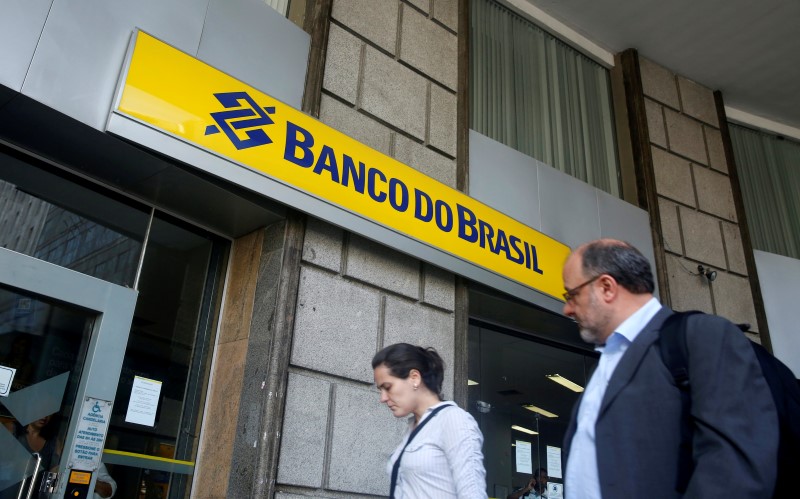By Guillermo Parra-Bernal
SAO PAULO (Reuters) – Brazil’s state-controlled banks, which have seen defaults and loan-loss provisions outpace those of rivals this year, are more confident than their private-sector competitors that Latin America’s largest economy will soon emerge from a severe recession. Executives at Banco do Brasil SA, the nation’s largest bank by assets, said on Friday that provisions likely peaked in the second quarter, on hopes household and corporate budgets will recover after a two-year crisis. Top mortgage lender Caixa Econômica Federal sees defaults declining by year-end. Their bullish tone contrasts with the view of Brazil’s top-two private-sector banks, Itaú Unibanco Holding SA and Banco Bradesco SA, which do not expect defaults to fall until next June. Both lenders faced a deluge of requests to renegotiate existing loans last quarter as the economic crisis left many of their largest corporate borrowers short of cash. The recession will force state and private-sector banks to keep reclassifying at least 90 billion reais ($28 billion) in troubled corporate loans, as bankruptcy filings doubled in the past year. More than half that amount, analysts say, remains on state lenders’ balance sheets. “I can assure you all that we have managed things more conservatively here than many private-sector banks did,” Paulo Rogerio Caffarelli, who took over as chief executive officer of Banco do Brasil last month, told reporters at an event on Thursday. Investors are giving Caffarelli, as well as CEO Gilberto Occhi of Caixa Econômica, the benefit of the doubt. Shares of Brasilia-based Banco do Brasil Brazil’s interim President Michel Temer, who replaced ousted Workers Party leader Dilma Rousseff as president in May, named Caffarelli, a former finance ministry official, and Occhi, a former cabinet minister, as part of a wider shake-up of leadership of state firms. On Friday, Occhi said that faster loan renegotiations at Caixa helped bring down the default ratio last quarter. Caffarelli and his team at Banco do Brasil said future surprise cases of problematic lenders are unlikely, a prediction his peers at Itaú “While asset quality continues to be an issue for the sector, results across the system indicated that we are close to the bottom,” said Tito Labarta, an analyst with Deutsche Bank Securities. “Banco do Brasil should benefit the most” with a recovery, he added. OPTIMISM
Banco do Brasil fueled optimism by raising an annual interest income growth target to between 11 percent and 15 percent, from 7 percent to 11 percent in February. Caffarelli cited “ample room for loan repricing” even if Banco do Brasil cuts loan disbursements through year-end. Still, loans in arrears for at least 90 days at Banco do Brasil rose the most since 2009 during the second quarter. Recurring net income lagged analysts’ estimates as a result.
Banco do Brasil has more room than Itaú or Bradesco to charge more for loans, Caffarelli said, adding that a recovery in demand for credit is likely to gain traction early in 2017.
Caixa Econômica posted a 91 percent surge in quarterly profit even after having to double loan-loss provisions.
“We believe that we have the ability to reverse the negative cycle, especially in terms of defaults,” Occhi told reporters in São Paulo.
In recent weeks, retail sales and industrial output modestly resumed growth, fueling optimism that Brazil is emerging from its longest recession since the 1930s. Rousseff’s replacement by a more business-friendly administration has fueled hefty gains in Brazil’s stocks, bonds and currency since April. (Additional reporting by Aluísio Alves in São Paulo; Editing by Christian Plumb and Dan Grebler)
Brazil state banks assume bullish tone as recovery hopes take hold

By Guillermo Parra-Bernal
















